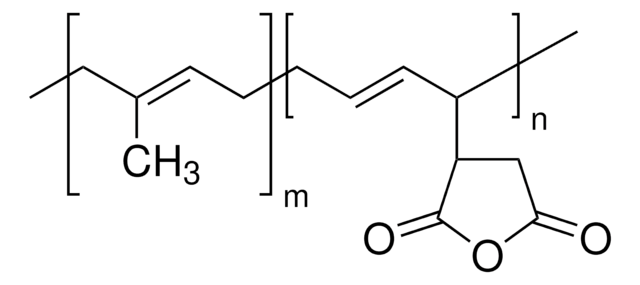531367
Poly[(isobutylene-alt-maleic acid, ammonium salt)-co-(isobutylene-alt-maleic anhydride)]
average Mw ~60,000
Synonym(s):
maleated copolymer, maleated polymer, maleic copolymer
Sign Into View Organizational & Contract Pricing
All Photos(2)
About This Item
Linear Formula:
(C4H2O3 · C4H8)m · xH3N
CAS Number:
MDL number:
UNSPSC Code:
12162002
NACRES:
NA.23
Recommended Products
mol wt
average Mw ~60,000
pH
7.0 (5% in H2O)
viscosity
10.3 cP, 0.5 % in H2O(25 °C)(lit.)
solubility
H2O: soluble
density
1.3 g/mL at 25 °C (lit.)
Looking for similar products? Visit Product Comparison Guide
Related Categories
General description
Poly[(isobutylene-alt-maleic acid, ammonium salt)-co-(isobutylene-alt-maleic anhydride)] (PIM) is a water soluble polymer.
Application
Binder for ceramic powders and dispersing agent for water soluble paints.
PIM may be used to prepare montmorillonite (MMT) clay and amylopectin-based nanocomposites. PIM may be used as a dispersant for the preparation of NiO/Y3O3-ZrO2 for solid oxide fuel cells (SOFCs). PIM may also find use as a coupling agent.Binder for ceramic powders and dispersing agent for water soluble paints.
Storage Class Code
11 - Combustible Solids
WGK
WGK 3
Flash Point(F)
Not applicable
Flash Point(C)
Not applicable
Certificates of Analysis (COA)
Search for Certificates of Analysis (COA) by entering the products Lot/Batch Number. Lot and Batch Numbers can be found on a product’s label following the words ‘Lot’ or ‘Batch’.
Already Own This Product?
Find documentation for the products that you have recently purchased in the Document Library.
Cornelia Vasile & Gennadii Efremovich Zaikov
Environmentally Degradable Materials Based on Multicomponent Polymeric Systems null
Starch Nanocomposites with Platelet and Fibrillar Fillers.
Nordqvist D, et al.
Journal of Biobased Materials and Bioenergy, 3(2), 139-146 (2009)
Fabrication and Characterization of Anode-Supported Tubular Solid-Oxide Fuel Cells by Slip Casting and Dip Coating Techniques.
Zhang L, et al.
Journal of the American Ceramic Society. American Ceramic Society, 92(2), 302-310 (2009)
P B Kernoff et al.
Blood, 63(1), 31-41 (1984-01-01)
Circulating antibodies to factor VIII (anti-VIII, "inhibitors") occurring in patients with hemophilia neutralize porcine factor VIII less readily than human factor VIII in vitro. Over an 18-mo period, 8 patients with anti-VIII were treated with 45 courses (297 infusions) of
Abhimanyu Paraskar et al.
Nanotechnology, 22(26), 265101-265101 (2011-05-18)
The use of cisplatin, a first line chemotherapy for most cancers, is dose-limited due to nephrotoxicity. While this toxicity can be addressed through nanotechnology, previous attempts at engineering cisplatin nanoparticles have been limited by the impact on the potency of
Our team of scientists has experience in all areas of research including Life Science, Material Science, Chemical Synthesis, Chromatography, Analytical and many others.
Contact Technical Service







